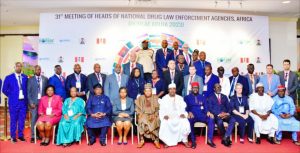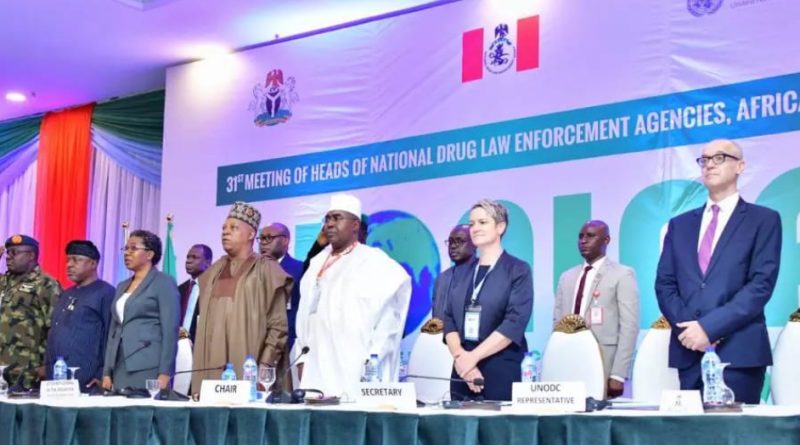Buba Marwa Chairs 31st Meeting of HANOF
Maryam Aminu
Delegates from 54 African countries and 15 observer nations meets in Abuja for the 31st meeting of Heads of National Drug Law Enforcement Agencies, Africa (HONLAF) from 26th- 29th September, 2023 to discuss new trends and partnerships to curb the global drug scourge which was chaired by the Chief Executive Officer of NDLEA, Brig. Gen. Muhammad Buba Marwa
Nigeria is facing complex and multifaceted challenges related to cultivation, manufacturing, trafficking and use of various types of illicit drugs.
In his keynote address titled: Rising Above the Drug Threat, the president Bola Ahmad Tinubu who was represented by Vice President Kashim Shettima stressed the need for the anti-narcotics agencies to consolidate established contacts, strengthen operational existing partnerships and cooperation among them at the sub-regional and regional levels.Adding that it, would make trafficking of illicit drugs and movement of drug syndicates difficult in the African continent.
He stated that Africa was at the mercy of a threat that knows neither race nor geography, neither gender nor social class.
He reiterated the need for global partnerships in addressing drug trafficking and other vices, noting that world’s drug problem cannot be effectively tackled by individual entities.
The President expressed his administration’s commitment to the country’s fight against substance abuse and illicit drug trafficking
Tinubu also assured he will continue to provide necessary support and tools for the National Drug Law Enforcement Agency, NDLEA, to fulfil its mandate
“We understand the connection between the success of the fight against substance abuse and illicit drug trafficking and the attainment of a number of goals on our social economic and security agenda”
“For us, the commitment to the fight against drug trafficking and substance abuse is not just a matter of policy; it is a moral imperative. We recognize that a population at war with drugs is not a dividend but a liability. We believe that the future of our youth, the strength of our institutions, and the well-being of our communities depend on our ability to eradicate this threat.
We believe that the future of our youth, the strength of our institutions, and the well-being of our communities depend on our ability to eradicate this threat. Said Tinubu
“So, I must appeal to you to see this gathering as an avenue for the exchange of vital ideas and the development of practical strategies. We must consolidate established contacts, operational partnerships, and cooperation to ensure that the outcomes of this four-day deliberation advance public safety and the emergence of drug-free African communities.
Our strength has always been our proactive actions to prevent any individual or group from turning our countries into a minefield of drug trafficking. So, we must prioritize prevention, education, and rehabilitation to empower our youth with knowledge and opportunities. We must steer them away from the treacherous path of drug abuse and trafficking and protect our economy from the consequences of their actions. Tinubu
Speaking earlier, the Chairman of the meeting, the Executive Officer, Buba Marwa said young people are more prone to drug abuse than older generations.
Marwa added that the danger is doubled considering the unavailability of treatment for people suffering from drug-use disorders.
“Young people are using more drugs than previous generations and majority of people being treated for drug use disorders in Africa are under the age of 35. What is worse is the availability of treatment and other services has not kept pace with these developments and women in particular are suffering from treatment gaps.”
Marwa noted that “Drug use disorders are harming health, including mental health, safety and well-being, while the harms caused by drug trafficking and illicit drug economies are contributing to many of these threats, from instability and violence to environmental devastation.
Speaking further, the Country Representative, United Nations Office on Drugs and Crime, Oliver Stolpe noted that the problem of drugs has changed from what it used to be 20 years ago
Also, the Executive Director, UNODC, Ghada Fathi Waly and the Chairman, UN Commission on Narcotic Drugs who both spoke virtually expressed support for the gathering and charged delegates to maximise the opportunities provided by the platform.
In his remarks, the Attorney General of the Federation and Minister of Justice, Lateef Fagbemi, SAN represented by the Director, International Criminal Justice Cooperation, Federal Ministry of Justice, Mrs. Nkiruka Jones-Nebo said It is imperative that this conference remains proactive in addressing the legal complexities that may impede seamless cooperation in intelligence sharing, joint operations, and training. These barriers must be dismantled to prevent any loopholes that could potentially facilitate the activities of drug cartels operating across our borders.
Fagbemi assured that the Federal Ministry of Justice stands committed to providing unwavering support and efficient systems to empower National Drug Law Enforcement Agency in achieving mission,




